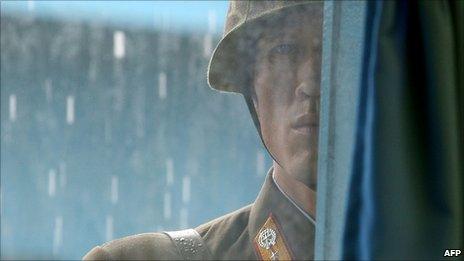Korea war games sign of growing tensions
- Published

Relations between North and South Korea have become shrouded in mistrust
These are tense times on the Korean peninsula, reason enough for two high-profile US visitors - the US Secretary of State Hillary Clinton and the Secretary of Defence Robert Gates - to be in South Korea at the same time.
The sinking last March of the Cheonan, a South Korean naval corvette, precipitated a new round of tensions between North and South. Forty-six sailors died in the incident.
A detailed investigation sponsored by the Seoul government, with the involvement of foreign experts, indicated that the vessel had been sunk by a deliberate attack, almost certainly from the North. But the North Koreans still insist that they were not involved.
International response to the incident has been mixed. South Korea was determined to take the matter to the United Nations Security Council. This body released a statement on 9 July which condemned the attack but fell short of directly blaming the North Koreans.
There was a huge measure of politics here; none of the key players - Russia, China or the US - wanted to exacerbate tensions further, and it was clear that Moscow and Beijing would not back tougher action.
The joint US-South Korean naval exercises, scheduled to begin on 25 July, following on from the high-level diplomacy, are one way for Washington to reassure its uneasy ally.
Large fleet
The growing unease in the region is compounded by what many analysts see as the start of a succession struggle in North Korea, as the ailing leader Kim Jong-il seeks to prepare the way for his successor.
The USS George Washington is the most visible part of the US-South Korean exercise
The fear is that the North Korean government, which is unpredictable at the best of times, might use the joint US-South Korean naval exercises as a pretext for some further military action.
That is one reason why China is so concerned about the naval exercises. A Chinese foreign ministry spokesman has urged the "relevant parties to remain calm and exercise restraint" and "not to do anything to exacerbate regional tensions".
It is a message directed as much at Pyongyang as it is at Seoul and Washington. But Beijing is also unhappy about the naval exercises for its own reasons too.
A later stage of the US-South Korean manoeuvres will take place in the Yellow Sea, between the Korean peninsula and China.
And this is no small war game: the initial phase of the exercise in the Sea of Japan includes the nuclear-powered aircraft carrier the USS George Washington, 20 other ships and submarines, and some 100 aircraft.
For Beijing, these waters constitute the vital approaches to its own territory. China is worried by any major foreign naval presence in this area at a time when it is expanding its own maritime operations and reach.
It will take a long time for China to be able to rival US sea power in any serious way. But China's naval ambitions are clear.
Long-term hopes
All this adds to the complexity of the US-Korea-China triangle.
It is in some ways the diplomatic equivalent of the Bermuda triangle: an area of diplomatic uncertainty where catastrophe beckons if any country makes the wrong move.
Purists might argue that this is not a triangle as such since there are four players involved and a number of complex sets of relationships: between North and South Korea; between Washington and Seoul; and between Beijing and Pyongyang.
Hanging over all of this, of course, is the much broader relationship between China and the US.
The future trajectory of this relationship is hard to chart. The two countries are bound together economically in so many ways but clearly have their own specific strategic interests.
They are not inevitably set on a collision course, once a frequent theme in futuristic war novels. But what happens on the Korean peninsula is going to have an important bearing on their long-term relationship.